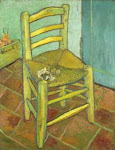
One of Vincent's closest friends in Arles -- and a critical character in "Sunflowers" -- was Joseph-Etienne Roulin, an entreposeur des postes (postal agent) who worked at the railway station. We first learn of Monsieur Roulin in a letter to Theo from the end of July, when Vincent enthusiastically describes the subject for a new painting (the painting seen here, click to enlarge). We're not sure when the two men actually met, but the place was likely the Café de la Gare, where Vincent was living at the time. Both men were habitués of the café, Roulin living only a short distance from Vincent; van Gogh would later say that Roulin accepted drinks as payment for modeling. Over time Roulin would be the subject of several paintings and drawings by Vincent (so would all the members of his family), but this first painting remains my personal favorite. Today in the Museum of Fine Arts, Boston, the canvas shows Roulin proud in his uniform, cozied up to a table as if ready for a mug of beer. Roulin posed a bit stiffly for it, Vincent would complain to Theo, but still, the face shows the calmness and wisdom that would serve Vincent well in the months to come.
We know from surviving letters -- Vincent's letters and those of Roulin himself -- that Roulin and his wife remained supportive of Vincent throughout his time in Arles. According to the memoirs of Johanna van Gogh-Bonger (Theo's wife), Roulin was in the brothel the night of 23 December 1888, when Vincent appeared with the piece of his ear, and helped Vincent out of there. While Vincent was in hospital during that first breakdown, Roulin and his wife Augustine both went to see him; Roulin in turn sent letters to Theo and Vincent's sister Willemien updating them on his condition. It was Roulin who apparently met with the head of the Arles hospital and persuaded him to release Vincent, when debate was being held about committing Vincent to an asylum. Even after Joseph Roulin was transferred to Marseille in January 1889 (one of the few chronological changes I made in "Sunflowers" was keeping him in Arles until August 1889), he still kept contact with Vincent. The rest of the Roulin family remained in Arles until October 1889, when Monsieur Roulin was able to move them to Marseille, and they too seem to have kept contact until Vincent left for Saint-Rémy in May 1889. Conspicuously absent from the signed petition of March 1889 -- in which many of the Arles townspeople tried to have Vincent forcibly committed -- are any names from la famille Roulin. In his letters, Vincent speaks of the Roulins as a model family, praising Joseph Roulin in particular for his wisdom, his politics (he was an "ardent republican," according to Vincent), and his fatherhood. "A good soul," Vincent calls him, and elsewhere says Roulin as an artistic subject is "in the manner of Daumier."
One of the treats of the Van Gogh Museum's new translations of Vincent's correspondence is the publication in English for the first time of more Roulin letters: four letters sent to Vincent by Joseph Roulin while the former was in the asylum at Saint-Rémy and the latter was in Marseille. These letters not only reveal that Vincent maintained correspondence with his friend during this time (unfortunately Vincent's letters to Roulin do not survive), but also the depth of their friendship. "Monsieur Vincent," Roulin calls van Gogh with respect, his words leaving no doubt of his high regard for the painter. We learn from these four letters that Vincent must have had good relations with Roulin's children, for Roulin gives newsy accounts of their activities, especially the then-toddler Marcelle. Roulin's notes to Vincent are reassuring, telling him that he is in beautiful country at Saint-Rémy, encouraging him to paint. Indeed, these letters suggest that Roulin and Vincent talked about painting quite a bit. Vincent certainly gave the Roulins paintings; Roulin talks about the portraits Vincent had given them and the pleasure the pictures give his family.
In the last letter surviving from Roulin to Vincent, dating from late October 1889, Roulin says, "let us hope that one day again we shall have the happiness to shake hands and to tell each other in person such good things and to cement our friendship once more; I am confident and am full of hope to see you again one day." Unfortunately for the two friends, it never happened.






No comments:
Post a Comment